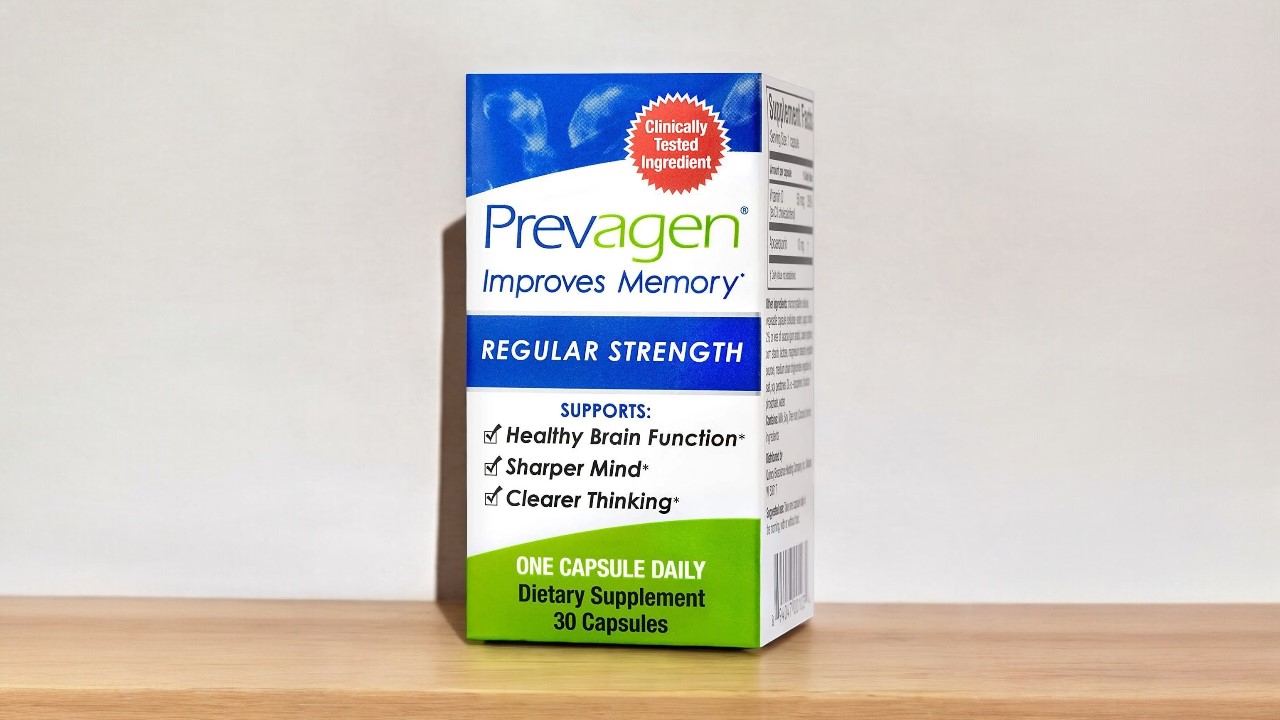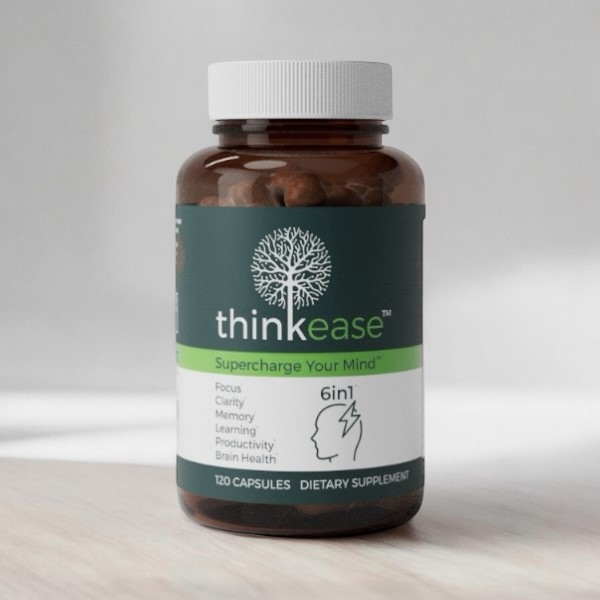Prevagen Review & Test Results - Does It Really Improve Memory?

By Richard Davidson, October 20 2025
What Is Prevagen?
Prevagen is sold as a memory aid and general “brain health” supplement. The formula is extremely minimal, with just two actives, both in small doses. Its headline ingredient is apoaequorin, a protein originally found in jellyfish, which is unusual in this category and, in my view, not convincingly proven for memory support. The product is made by Quincy Bioscience. It’s worth noting the company has faced regulatory challenges over past marketing claims about memory improvement.
In this review, I’ll dig into the research behind Prevagen’s ingredients, especially apoaequorin, and share what I observed after trying it myself. The aim is simple: separate the claims from what the evidence (and real-world use) actually supports.
Key Points
- Prevagen uses two ingredients, Vitamin D and apoaequorin, neither of which are proven to deliver near-term brain benefits.
- I found Prevagen made no discernable improvements to overall cognitive performance or memory function.
- Prevagen's maker has been charged with false advertising. In 2024 a jury found many of the brand's claims to be "materially misleading."
- There are far more comprehensively formulated and scientifically proven products available. The top rated brain supplement in my testing is ThinkEase. It uses 15 proven nootropic ingredients in clinically proven amounts, we found it noticeably improved focus, concentration and memory.

How Does Prevagen Work?
Prevagen relies heavily on its main ingredient apoaequorin in creating its marketing story and product claims. The evidence supporting apoaequorin as a brain and memory supplement is however extremely limited. There's no robust peer-reviewed research supporting its effectiveness and the research that does exist has been sponsored by the brand itself, meaning its finding are likely to have been influenced by this financial incentive - furthermore the studies conducted aren't considered scientifically robust. The research itself is hard to find and the information available is very limited, this lack of transparency raises further questions over the research methodology and findings on which the brand relies for its claims.
In the absence of robust and transparent data, it's impossible to conclude that apoaequorin is effective in providing any form of brain support, or indeed in improving memory. The brand does claim to support brain function and improve short-term memory, but relies entirely on these problematic studies as support.
Alongside apoaequorin, Prevagen also includes a modest 50mcg of Vitamin D. The benefits of Vitamin D are well-documented but its brain benefits are less frequently discussed. Adequate Vitamin D is important in supporting overall brain function and possibly in protecting neurons. While Vitamin D is a welcome addition, the form used in Prevagen is nothing special, eating a balanced diet or using a regular Vitamin D supplement (or multi-vitamin) is a simple and likely more cost effective way to ensure you're not deficient in this vital but low cost ingredient.
Neuriva Ingredients
- Vitamin D (50mcg), Apoaequorin (10mg)
- Other ingredients: Microcrystalinecellulose, Vegetable Capsule, Maltodextrin, Casein Peptones, Lactose, Magnesium Stearate, Modified Corn Starch, Salt, Soy Peptones, Sugar.
- Contains: Milk, Soy, a bioengineered food ingredient.
Prevagen Ingredients Versus ThinkEase (Top Alternative)
Ingredient | Neuriva | ThinkEase |
|---|---|---|
Vitamin B6 | None | 2.5mg |
Vitamin B9 | None | 100mcg |
Vitamin B12 | None | 7.5mcg |
Acetyl L-Carnitine | None | 750mg |
Lion's Mane | None | 550mg |
Bacopa Monnieri | None | 300mg |
N-Acetyle L-Tyrosine | None | 275mg |
Citicoline | None | 250mg |
L-Theanine | None | 200mg |
Rhodiola Extract | None | 200mg |
Ginkgo Biloba | None | 120mg |
Korean Ginseng | None | 100mg |
Phosphatidylserine | None | 100mg |
Pine Bark Extract | None | 75mg |
Spanish Sage | None | 25mg |
Vitamin D | 50mcg | None |
Apaoequorin | 10mg | None |
Clean Ingredient Profile | No | Yes |
Premium Grade Capsule | No | Yes |
Capsules per Bottle | 30 | 120 |
Scientific Basis
Prevagen's formula isn't well supported by scientific evidence. The clinical data on apoaequorin is lacking and limited to studies conducted by the brand itself. The fact that the claims made about the effectiveness of Prevagen have been successfully challenged in a court of law raises additional concerns. The study into apoaequorin was a double-blind placebo-controlled trial with adults aged 40-91, paid for by the makers of Prevagen. The Madison Memory Study, as it was called, did report improvements in verbal learning on the CogState International Shopping List tasks. Despite this, concerns remain. Firstly, the funding source for the study presents a clear conflict of interest as the authors may have been more likely to report favorable results. Secondly, there was only a single study, meaning the results may not be repeatable and consequently could be at risk of bias. Thirdly, the study only lasted for 90 days, limiting its ability to accurately measure any improvements. Furthermore, despite the study being a double-blind test, there is a significant risk of placebo and expectation effects if participants knew they were part of a study into a memory supplement.
The inclusion of Vitamin D is less contentious, but it's also a low cost ingredient with limited brain benefits - unless being taken by someone deficient in Vitamin D. It's also interesting to note that the total amount of active ingredients in Prevagen is very low, too low to fill even a single capsule, this means it's highly likely that the capsule contains fillers - ingredients used to bulk out the contents of the capsule. This is evidenced by the inclusion of a range of non-active ingredients including Maltodextrin, Magnesium Stearate, Salt and Sugar - ingredients we don't really like to see in a supplement product.
Qualitative Review of Prevagen's Efficacy
My Prevagen trial lasted a total of 90 days, purposely in line with the duration of the brand's contentious research study. The product is easy enough to take, with only 2 ingredients and a total dosage of little more than 50mg it only requires one capsule. However, as mentioned there's very little scientific support for the use of apaoequorin's use as a memory supplement, or as a general cognitove support supplement. My expectations were therefore subdued, but I aimed to be open-minded to the possibility of having a positive experience.
While I wouldn't necessarily have expected to experience dramatic changes in the first few days of taking Prevagen, it was notable that I experienced no discernible changes to any of the cognitive processes I was monitoring. With other brain supplements and nootropic supplements, I'm used to feeling a degree of improvement to focus on clarity early on, potentially followed by more gradual improvements to cognitive function, including the ability to understand and recall new information, as well as improved memory overall, albeit slowly with most of the products I've tested.
As the trial continued I couldn't help feeling that the product has a good marketing angle with its unique ingredient, but the choice to focus on using an ingredient with such limited proven potential in a clinical setting wasn't perhaps in the best interest of its users. Taking the product everyday became a chore, not because it was difficult to take, but because it offered nothing in return for following this routine. Perhaps I was unlucky, or missed some of the products more subtle effects, but its more likely that the effects just aren't there in any meaningful way. There could be a longer-term neuro-protective benefit which I wouldn't have experienced directly, but again the science doesn't really support that possibility - and there are ingredients known to provide that benefit far more robustly.
Estimate of Efficacy Relative To Similar Products
Dosage:
Prevagen uses just 2 ingredients (Vitamin D, apaoequorin) and in total has just over 50mg of active ingredients. For contrast, the top-rated brain supplement in our testing contains 15 ingredients and almost 3000mg of active ingredients per serving.
Quality:
Prevagen's 50mg serving size is insufficient to fill the capsule used, meaning that much of the capsule's contents is effectively filler, in other words compounds added to the formulation to bulk it out and make the capsule look full. In some ways this is necessary when dealing with such a small amount of active ingredients, but a more skeptical view is that it can be used as a deceitful practice by some supplement manufacturers, the aim being to mislead consumers into thinking, or feeling, they're getting more for their money than they really are. The use of silicon dioxide, maltodextin, sugar and salt raises further quality concerns. In our view these ingredients have no place in a high quality supplement, it can be argued that silicon dioxide is needed to blend the ingredients, but there are cleaner options available. The capsule is a standard vegetable capsule, making it suitable for vegetarians.
Efficacy:
The improvements to cognitive function we experienced from using Neuriva were modest. The benefits of the product simply don't compare to the best brain supplements I've tested. I put this down to the product prioritizing a basic marketing story, rather than tangible real world benefits for consumers. There's a significant difference between a basic product like Neuriva and the best brain supplements I've tested like ThinkEase.
Cost:
In my view the very limited benefits offered by Prevagen make it poor value for money overall. It's typically priced at $40 for just 30 capsules (source: Amazon and Prevagen's own online store).
Safety Considerations and Potential Side Effects
There's a very low risk of any adverse side effects from Prevagen. The low dose of Vitamin D is highly unlikely to be problematic, but it may be prudent to not supplement with more Vitamin D alongside Prevagen. Similarly, apaoequorin is unlikely to cause any adverse reactions, but it's important to be aware that no studies exist into its long-term benefits or risks.
Overall Assessment
Looking at the scientific evidence for the ingredients used in Prevagen doesn't back-up the brand's claims and the 2024 court ruling that the brand has made many misleading claims gives cause for concern, or at least some healthy skepticism when it comes to assessing the brand's claims and marketing practices. My own tests with the product didn't find any clear cut cognitive improvements, or more specific improvements to memory and recall. I therefore can't recommend Prevagen as there are much more effective alternatives available, most notably the top-performer in my testing, ThinkEase - which provided tangible improvements across a wide range of cognitive functions, including memory. ThinkEase's science led approach focused on clinically proven ingredients is a safer and more effective option in my view.
References and Further Reading
Effects of a Supplement Containing Apoaequorin on Verbal Learning in Older Adults in the Community
Daniel L Moran, Mark Y Underwood, Taylor A Gabourie, Kenneth C Lerner. https://pubmed.ncbi.nlm.nih.gov/26878676/
Vitamin D, effects on brain development, adult brain function and the links between low levels of vitamin D and neuropsychiatric disease
Author links open overlay panel. Darryl W. Eyles, Thomas H.J. Burne, John J. McGrath. https://doi.org/10.1016/j.yfrne.2012.07.001
